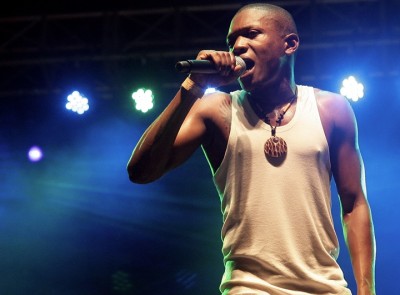Blog September 9, 2014
Field Report: Dancing in the Rainforest of Malaysia
Bastiaan Springer, a producer for Radio 5, Netherlands, and a world music journalist since 1984, traveled to the lush tropical island of Borneo to report on the 17th annual Rainforest World Music Festival in Sarawak for Afropop.
According to the British world music magazine Songlines, the Rainforest World Music Festival (RWMF) in Malaysia is among the top 25 world music festivals on the planet. The unique location alone makes attending this festival memorable: It's in the middle of the tropical rainforest of Sarawak, well known for its unique flora and fauna, not to mention the wonderful climate, the delicious Malaysian cuisine, the ever-friendly Malaysian people, and of course, the music program that brings together renowned musicians from all continents and indigenous musicians from Malaysia.
Since 1998 the Sarawak Cultural Village, a beautiful collection of tribal houses near the beach of Damai, has been home to the festival, which took place this year July 20-22. Damai is a half-hour’s drive from Kuching, the charming and laidback capital of Sarawak, a Malaysian state in the northwestern part of the island of Borneo
This year’s 17th edition was attended by 20,000 people from all parts of the world, from young kids from Malaysia, Singapore, Australia and New Zealand to older world travelers, world music lovers and travel writers. The atmosphere was very relaxed, a bit like the hippies' heyday of the late ‘60s.
Daytime in the Sarawak Cultural Village was reserved for informative workshops, ethno-musical lectures, jam sessions and mini-concerts. Most activities took place in the so-called longhouses, traditional wooden stilt houses where the indigenous people of Sarawak still live.
Lovers of African music were pleased with the session by the German author, filmmaker, music researcher and manager Werner Graebner, who described the evolution of the music of Tanzania. The members of Jagwa Music, one of the headliners of the festival, illustrated his lecture with live music.
Another workshop, appropriately titled "Big and Round," was a spontaneous jam session with percussionists from all performing festival groups. In other workshops one could learn traditional Malaysian dances and typical Malaysian rhythms. The community drum circle in front of the main stage, a spectacular feature that took place each evening, was a huge success. Over a hundred small percussion instruments were shared with the audience, forming two circles of jammers who played and chanted for over an hour.
The evening program offered music from all parts of the globe, from the Italian tarantella of Canzoniere Grecanico Salentino, and Ukrainian folkpunkrock from DakhaBrakha, to the South Indian percussion group Karinthalakoottam, and Maori music by Horomona Horo. Cuba was represented by the London-based Son Yambu, and from Canada came Gordie Mackeeman and His Rhythm Boys, a real party band; along with Malaysian groups like the Bisayah Gong Orchestra, a unique ensemble which revives the dying tradition of brass gong playing; and Nading Rhapsody, a traditional group from Sarawak, offering an interesting mix of folk songs, ritual chanting, lullabies, myths and stories of ethnic groups of Sarawak.
Two highlights from the RWMF came from Africa: Debademba from Burkina Faso/Mali and Jagwa Music from Tanzania. Promoting African music in Malaysia is not an easy thing because there is no tradition, as in Europe and the U. S., of bringing African groups to this part of the world. On Malaysian radio and television African music is never promoted. But thanks to the vision and courage of RWMF artistic director Jun-Lin Yeoh, two great African acts made their Asian debut.
Last year at the WOMEX (World Music Expo) conference in Cardiff, Wales, Debademba gave a great performance and they are generally considered one of the new musical sensations from West Africa. Debademba (meaning Big Family) was formed in 2009 in France by Mohamed Diaby, born in Ivory Coast and raised in Mali, and Abdoulaye Traoré, a native of Burkina Faso, a real master on the acoustic and electric guitar. Traoré traveled around West Africa in the early 1990s and collaborated with singer Victor Deme and the group Les Go de Koteba. Diaby, brought up in the great tradition of Malian griots, was discovered in 2007 by the Malian TV program “Case Sanga,” a showcase for new talent under the sharp eyes and ears of Oumou Sangaré. He is blessed with a great voice reminiscent of Salif Keita's. A brilliant guitar player and an exceptional improviser, Diaby plays all kinds of African musical genres, as well as flamenco, blues and Latin. Despite their efforts to set the stage on fire right from the start, it took a while before the crowd, not used to African music, started moving. But from the middle of the show the heat was on and after their last song almost everybody wanted an encore.
The group Jagwa Music consists of eight youngsters from the streets of the Tanzanian capital Dar es Salaam. Their very energetic music is called mchiriku and is based on a cross-fertilization of local chakacha dance music, rock, hip-hop, noise and distortion. Mchiriku originated 20 years ago in the slums of Dar es Salaam, where the biggest challenge is how to survive poverty and hunger. Jagwa Music sings about the poverty-related problems of daily life, and performs with a lot of sexual energy reminiscent of Angolan kuduro dance music. The instruments are a remarkable collection of traditional and makeshift percussion and a battered vintage Casio keyboard. The pure joyful enthusiasm of Jagwa Music soon energized the mainly young Asian and Australian crowd.
The Rainforest World Music Festival is a unique event in a stunning natural setting. Given the long trip to Malaysia, a visit to the festival can be best combined with a stay in Sarawak, which despite the deforestation still has much to offer to nature lovers. The dates for 2015 are Aug. 7-9.









